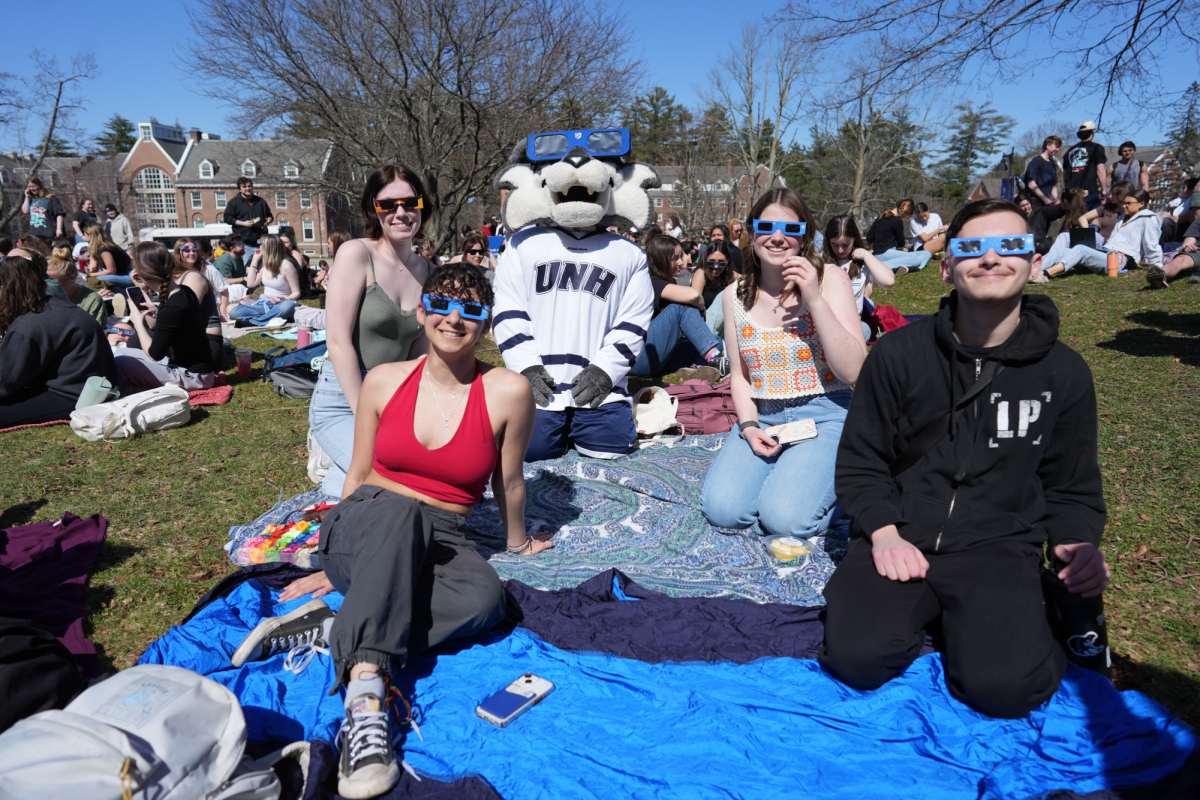By Hadley Barndollar, Staff Writer
Thirty-two billion dollars.
Human trafficking generates a yearly income greater than Google, Starbucks and Nike combined.
This statistic startled the crowd on Wednesday morning, as voices echoed through the Murkland Courtyard at the United Nations Global Initiative to Fight Human Trafficking (GIFT) Box display at the University of New Hampshire.
Representatives from the UN and the department of Homeland Security came to the display to speak on the “fastest-growing international crime.” It was a fitting time for the traveling presentation to arrive, as National Crime Victims’ Rights Week spanned from April 19 to 25.
The UN GIFT Box is a “walk-in piece of public art,” according to the GIFT Box Coordinator Deb O’Hara-Rusckowski. On display, a walk-in 3D box with the inside showcasing visual stories of local trafficking victims.
The box is meant to stand as a metaphor. The exterior sports alluring promises to attract bystanders, but once inside, an ugly truth is revealed.
“The outside of the box offers hope of a brighter, new life, but the inside demonstrates the deception of traffickers,” O’Hara-Rusckowski said.
Bryan Bessette, director of The Freedom Cafe in Durham, started off the presentation by giving the crowd a basic understanding of human trafficking on a worldwide level.
“There is a need for local communities to work together for a slave-free world,” Bessette said.
O’Hara-Rusckowski emphasized a fallacy into which too many people fall.
“The biggest misconception is that it’s happening ‘over there,’” she said. “It’s happening here, right in your own backyard.”
Michael Posanka, Manchester resident special agent in charge of Homeland Security Investigations, spoke of 25 potential human trafficking victims that have been identified in New Hampshire to date. He also addressed that there are two types of trafficking: sex and labor.
Mentioned by both Posanka and Peter DiMarzio, victim assistance specialist of Homeland Security Investigations, heroin is a common factor in many of these trafficking situations. Traffickers prey on addiction and use the drug as a means to control their victims. With the heroin epidemic sweeping many areas, this leaves an increase in vulnerability.
DiMarzio also spoke about the unfortunate lack of resources available to victims of trafficking, but emphasized the ongoing efforts to change this.
“Right now, technically we only have one safe house in all of New England with three beds,” he said. “Hopefully by the end of 2015 we’ll have two more additional safe homes, with around 25 more beds.”
Halfway through the presentation, Annie Donahue, interim dean of the Dimond Library, read a letter from Sen. Jeanne Shaheen. Shaheen was originally scheduled to speak at the event, but could not make it.
In the letter, Shaheen called human trafficking “a horrific industry” and labeled the UN GIFT Box an “alternative and productive way to have dialogue.”
An event attendee asked if trafficking was something the people of UNH and Durham should be concerned about. The Freedom Cafe’s Bessette revisited a case in 2012 where three workers from Guatemala, who were building The Cottages of Durham complex, were not paid for about a month. Bessette called this “labor exploitation” and used it as a tangible example to show that different types of trafficking are prevalent in all areas.
“Undoubtedly, hands down, there is trafficking on this campus,” O’Hara-Rusckowki followed up.
She referenced a story that was addressed in this particular UN GIFT Box. Jasmine Grey, a student from Bunker Hill Community College in Charlestown, Massachusetts, spent eight years in prostitution. Rusckowski emphasized how each day Grey sat beside students who would never recognize that her Gucci purses were from her trafficker. Hartford, Connecticut was another destination for a trafficking story told in the box.
The UN GIFT Box came to UNH from the University of Massachusetts, Lowell. Its next stop will be Boston College and then Faneuil Hall, also in Boston. Each location will feature stories unique to the area.
Mike D’Angelo, cafe board coordinator at The Freedom Cafe, summed up the efforts .
“The purpose is to name it and show people that it’s a reality in our world and in our local area,” he said.
Bessette ended the presentation with an endearing story. He had recently met a 6-year-old girl who had just watched a documentary on human trafficking in school. As it was close to Easter, she made her family buy fair-trade chocolate to ensure it was free of slave labor.
Follow Hadley on Twitter: @hbarndollar
























